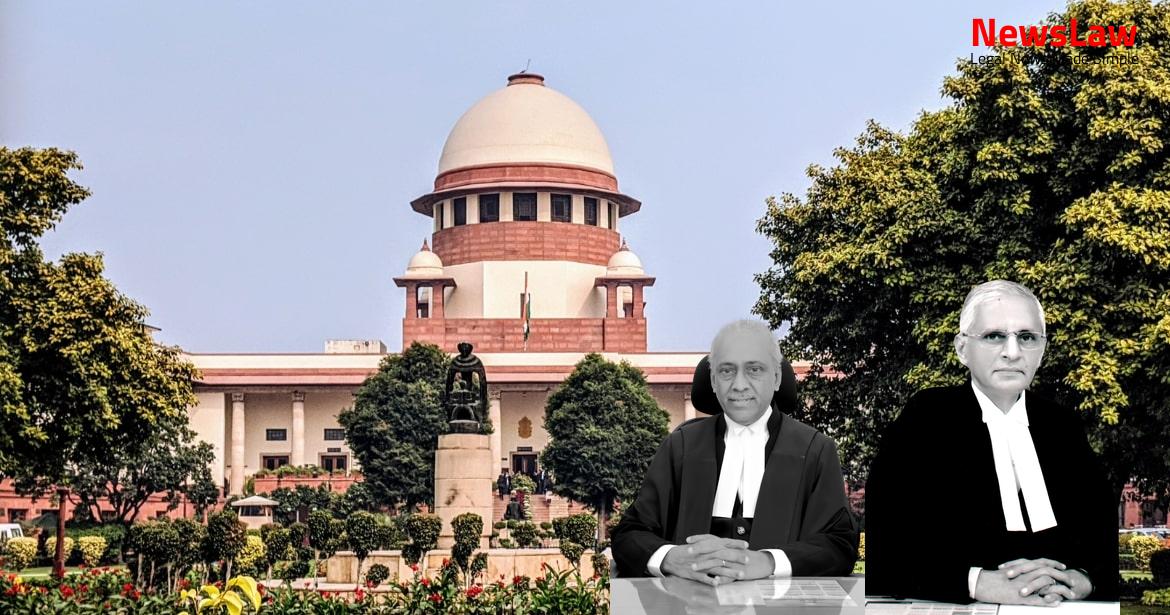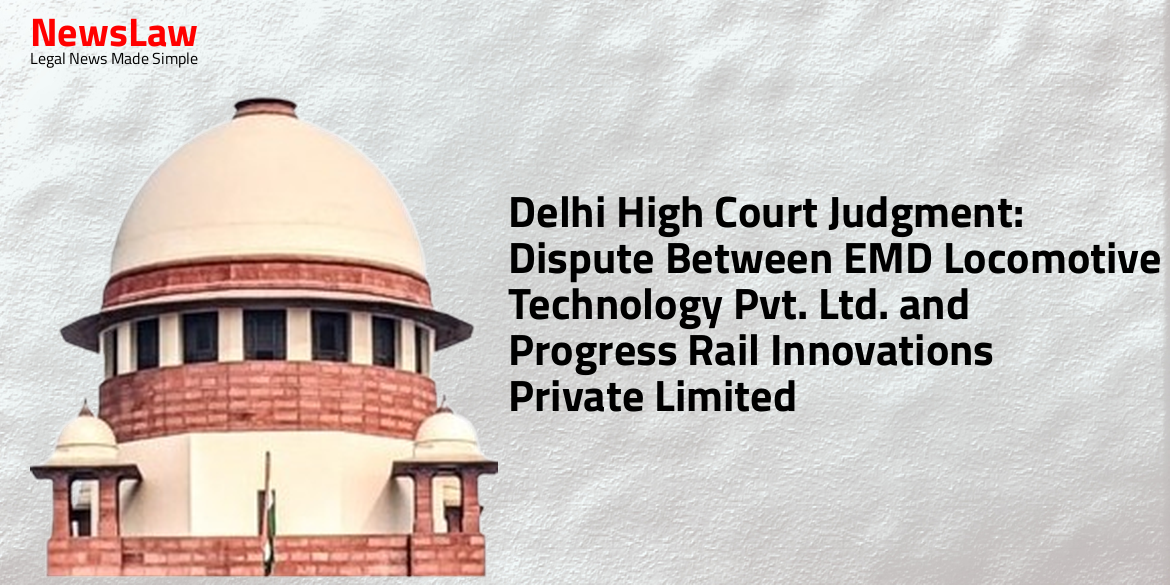Dive into the legal intricacies of a significant case concerning the interpretation of distribution license areas in the electricity sector. The court’s thorough analysis delves into regulatory requirements, statutory obligations, and the impact on market competition. This case sheds light on the critical role of courts in ensuring compliance and fair play in the electricity distribution industry.
Facts
- JSPL invested Rs.17.79 Crores in setting up twenty-four power intensive industries in Raigarh District.
- JSPL requested permission under Section 28 of the 1910 Act to sell power to industrial units in the proposed estate.
- A MoU was signed between CSIDC and JSPL for setting up the industrial estate.
- Permission for power supply by JSPL to new industrial units in four villages was granted by the Government of Chhattisgarh on 29.01.2003.
- JSPL started supplying electricity to industrial units from 01.03.2004.
- JSPL requested permission to establish an industrial estate in Raigarh and to set up transmission lines.
- Correspondences between JSPL, CSEB, CVMAS, and the Commission led to the decision to grant JSPL a distribution license under the 2003 Act.
- Appellate Tribunal upheld the Commission’s decision on 11.05.2006.
- JSPL applied for a license to distribute electricity to Jindal Industrial Park in Punjipathra and Tumdih villages of Garghoda Tehsil, Raigarh District.
- Appeals were filed challenging the distribution license, leading to remand and subsequent reevaluation by the Appellate Tribunal.
- The Commission granted a distribution license to JSPL on specific terms and conditions.
- The Appellate Tribunal set aside the Commission’s order and cancelled the license granted to JSPL.
- JSPL was not given an opportunity to be heard before the penalty was imposed.
- JSPL could not rely on the doctrine of promissory estoppel as the promise was only binding on the Government of Chhattisgarh, not the Commission.
- The penalty imposed on JSPL was set-aside by the Appellate Tribunal.
- JSPL’s eligibility for the distribution license was based on meeting capital adequacy, creditworthiness, and code of conduct requirements.
- The Commission’s decision to levy cross-subsidy charges on JSPL consumers was unjustified as it did not fall under open access.
- JSPL was required to obtain a license under Section 14 of the 2003 Act from the Commission.
- The Appellate Tribunal clarified the permissions needed for construction and power supply for JSPL.
- JSPL’s liability for punishment under Section 12 of the 2003 Act was not a key issue before the Commission.
Arguments
- JSPL has been supplying electricity to its consumers since 01.03.2004 and taken regulatory steps
- The 2005 Rules were enacted under the 2003 Act, and JSPL did not challenge their vires
- JSPL’s argument that the Explanation to Rule 3 has no authority of law is estopped as they have not challenged the 2005 Rules
- The appellant-JSPL acted bonafide with the permission of the State Government
- The cancellation of JSPL’s license affected consumers and revenue for the Chhattisgarh State Power Distribution Company Limited
- The National Electricity Policy dictates the minimum area for distribution licenses
- The appellant in these appeals is a consumer in Jindal Industrial Park affected by the license cancellation
- The Explanation to Rule 3 sets out conditions for granting a second distribution license, affecting JSPL and consumers
- The Commission had imposed special conditions on JSPL regarding the distribution license
- The 2005 Rules were introduced after the application for the license, JSPL’s argument against them is misconceived
- The minimum area condition for grant of a license must be met, according to the 2005 Rules and statutory obligations
- The Explanation to Rule 3 cannot be said to have no authority of law and should be followed as a guideline
- The Appellate Tribunal had no jurisdiction to interfere with the grant of the license
- JSPL’s supply of electricity was affected by the license cancellation, leading to financial losses
- The State Government’s actions in allowing JSPL to supply electricity were substantial under the law
- JSPL must fulfill its obligation to supply power to designated areas as per the license conditions
- The substitution of ‘relating to’ instead of ‘including’ does not restrict the rule-making power, as ‘relating to’ is of wide amplitude.
- Grant of distribution license was not in public interest but in favor of the appellant’s own interest.
- The ‘minimum area of supply’ as per Rule 3 of 2005 Rules is mandatory for granting subsequent distribution license in an existing area.
- The Appellate Tribunal rightly set aside the license granted to the appellant for power supply from its captive power plant.
- The sixth proviso to Section 14 was not narrowed down by the amendment, as claimed by the appellant.
- Permissions given by the State Government are conditional upon the license being granted by the Commission under the 2003 Act; appellant’s reliance on these permissions is incorrect.
Also Read: SC Clarifies: Choice of Depreciation Method Allowed Until Return Filing
Analysis
- Section 14 of the Electricity Act, 2003 allows the Appropriate Commission to grant licenses for various electricity-related activities.
- Licenses for transmission, distribution, and trading of electricity can be granted to individuals or entities as specified in the license.
- Existing entities engaged in electricity transmission or supply before the enactment of the Act are deemed to be licensees for a specified period.
- The Central Transmission Utility and State Transmission Utility are deemed to be transmission licensees under the Act.
- Distribution licenses are valid for 25 years from the date of issue, unless revoked earlier.
- Specific areas for distribution licenses are designated, and license holders must comply with relevant electricity regulations and safety standards.
- Distribution license holders must also undertake electrification of specified villages within a set timeframe and provide public lighting as required.
- The Damodar Valley Corporation and certain government companies are deemed to be licensees under the Act.
- Provisions for multiple distribution licensees in the same area and limitations on the need for separate licenses for electricity distribution within specified rural areas are outlined.
- Requirements for capital adequacy, creditworthiness, and code of conduct may apply to applicants for distribution licenses in the same area.
- Entities proposing to distribute electricity through a third party within their area of supply are responsible for the distribution.
- No separate license is required for generating and distributing electricity in specified rural areas, subject to compliance with regulatory authorities.
- Definitions for ‘license’, ‘licensee’, and ‘local authority’ are provided in the Act.
- The ‘minimum area of supply’ does not necessarily have to comprise the entire Municipal Council, Municipal Corporation, or Revenue District.
- The distribution licensee must file necessary applications with the Commission for tariff determination.
- The MoU clause allowing direct power sales to the industrial units was not to be interpreted as a grant of license.
- The license issued to JSPL was granted based on its establishment of an industrial park and including two additional villages for electricity distribution.
- The Electricity Act, 2003 seeks to encourage competition in the power sector with regulatory intervention.
- The Act aims to balance demand and supply continuously as electricity is not storable in the grid.
- The Act provides for notifying compliance requirements for subsequent distribution licenses.
- Second and subsequent distribution licensees must supply to all consumers as per the Act’s provisions.
- Regulation of tariffs and connection charges by SERCs is essential to prevent cherry-picking by licensees.
- The Act allows for licensing, amendment, and revocation of licenses under stipulated conditions.
- The ‘area of supply’ authorized must fall within a Municipal Council, Municipal Corporation, or Revenue District.
- JSPL’s license area does not have to cover the entire standard area, as long as it falls within the defined scope.
- The Appellate Tribunal erred in cancelling JSPL’s license due to CSEB’s inability to operate in the industrial park.
- Competition is expected to bring efficiency gains and quality electricity supply.
- The National Electricity Policy aims at robust power sector development and consumer protection.
- The Citation of relevant sections and definitions in the Electricity Act 2003 were provided.
- The ‘minimum area of supply’ must fall ‘within’ a specific local authority or district as defined by the Constitution.
- The controversy centered around interpreting the Explanation to Rule 3 of the 2005 Rules.
- Multiple licensees can operate in the same area of supply through independent systems as per the Sixth Proviso of Section 14.
- The ‘area of supply’ is the minimum covered by the license within the specified local jurisdiction.
- The area in which the licensee is authorized to supply electricity is the ‘minimum area of supply’ as per the defined rules.
- Strict compliance with the area of supply defined in the license is mandatory for the licensee.
- The 2005 Rules provide guidelines on capital adequacy and creditworthiness for distribution license applicants.
- Any interpretation requiring the licensee to cover the entire defined area would render certain provisions redundant or ineffective.
- The Appellate Tribunal’s decision to set aside the grant of distribution licence without appointing an alternative licence is considered ultra vires the 2003 Act read with the 2005 Rules.
- The scheme of the 2003 Act does not allow the Commission or Tribunal to cancel a distribution licence without hearing consumers.
- The purpose of the 2003 Act was to liberalize the generation, transmission, distribution, and supply of electricity and prevent monopolies from overcharging consumers.
- In the regime of multiple licenses introduced under the 2003 Act, the minimum area of supply requirement aims to prevent cherry-picking of high-end consumers in self-chosen areas of supply.
- The minimum area of supply condition is crucial for ensuring fair competition and creating a level playing field in the electricity distribution sector.
- Appellate Tribunal made an incorrect decision in canceling the license granted to JSPL.
- Impugned judgment should be set aside.
- No substance found in the contentions of respondent No. 2.
- Commission applied its mind to the license granted to the appellant for electricity distribution.
Decision
- The appeals have been allowed and the impugned judgment of the Appellate Tribunal is set aside.
- Pending applications are disposed with liberty given to applicants seeking impleadment to seek remedies in accordance with the law.
Case Title: M/S JINDAL STEEL AND POWER LTD. Vs. CHATTISGARH STATE ELECT. REG. COMMN.. (2022 INSC 1036)
Case Number: C.A. No.-003607-003610 / 2008



